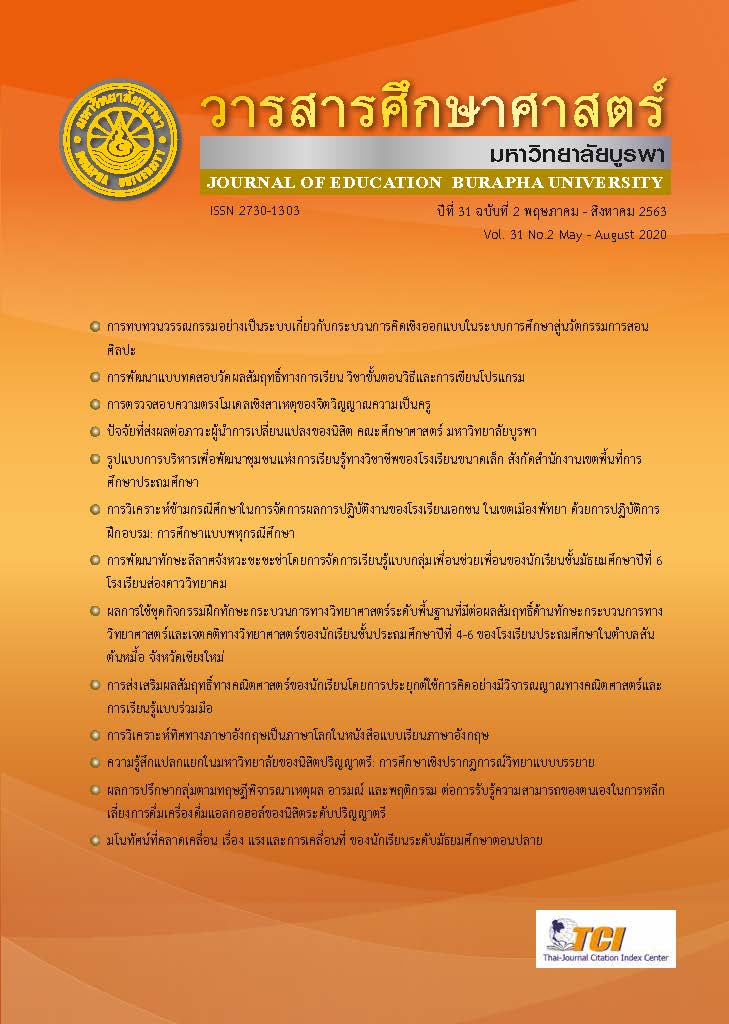การตรวจสอบความตรงโมเดลเชิงสาเหตุของจิตวิญญาณความเป็นครู
คำสำคัญ:
ความฉลาดทางอารมณ์, จิตอาสา, จิตวิญญาณความเป็นครู, โมเดลสมการโครงสร้างบทคัดย่อ
งานวิจัยนี้มีวัตถุประสงค์เพื่อตรวจสอบความตรงโมเดลเชิงสาเหตุปัจจัยที่ส่งผลต่อจิตวิญญาณความเป็นครูของนักเรียนชั้นมัธยมศึกษาตอนปลายในเขตพื้นที่บริการมหาวิทยาลัยราชภัฏร้อยเอ็ด ตัวอย่าง คือ นักเรียนชั้นมัธยมศึกษาตอนปลายในเขตพื้นที่บริการมหาวิทยาลัยราชภัฏร้อยเอ็ด จำนวน 1,025 คน ได้มาโดยการสุ่มแบบสองขั้นตอน เครื่องมือที่ใช้ คือ แบบสอบถาม ตัวแปรที่ใช้ในการวิจัย ประกอบด้วย ตัวแปรภายในแฝง 1 ตัวแปร คือ จิตวิญญาณความเป็นครู และตัวแปรภายนอกแฝง 2 ตัวแปร คือ ความฉลาดทางอารมณ์ และจิตอาสา ผลการวิจัย พบว่า โมเดลเชิงสาเหตุปัจจัยที่ส่งผลต่อจิตวิญญาณความเป็นครูของนักเรียนชั้นมัธยมศึกษาตอนปลายในเขตพื้นที่บริการมหาวิทยาลัยราชภัฏร้อยเอ็ดมีความสอดคล้องกับข้อมูลเชิงประจักษ์ (chi-square = 76.737, df = 63, p-value = 0.115, CFI = 0.999, TLI = 0.998, RMSEA = 0.015, SRMR = 0.020 และ chi-square/df = 1.218) ทั้งนี้ ตัวแปรในโมเดลสามารถอธิบายความแปรปรวนของจิตวิญญาณความเป็นครูได้ร้อยละ 49.20 และเมื่อพิจารณาขนาดอิทธิพลทางตรง พบว่า ความฉลาดทางอารมณ์และจิตอาสาส่งผลต่อจิตวิญญาณความเป็นครู อย่างมีนัยสำคัญทางสถิติที่ระดับ .01 และความฉลาดทางอารมณ์ส่งผลต่อจิตอาสา อย่างมีนัยสำคัญทางสถิติที่ระดับ .01 นอกจากนี้ยังพบว่า ความฉลาดทางอารมณ์ส่งผลต่อจิตวิญญาณความเป็นครูในทางอ้อมผ่านจิตอาสา อย่างมีนัยสำคัญทางสถิติที่ระดับ .01
เอกสารอ้างอิง
Brown, T. A. (2006). Confirmatory factor analysis for applied research. New York, NY, US: The Guilford Press.
Chalakbang, W. (2016). The Spirituality of Teachers: A Key Characteristic of Professional Teachers. Nakhon Phanom University Journal, 6(2), 123-128.
Darbavasu, S. (2017) Strategies for Developing Teacher Spirituality to Enhance Professional Teacher of Students in Faculty of Education, Suan Sunandha Rajabhat University. Ratchaphruek Journal; 15(1), 1-10.
Goleman, D. (1998). Working with Emotional Intelligence. New York : Bantam Books.
Harrington, D. (2009). Confirmatory Factor Analysis. New York: Oxford University Press, Inc.
Hair, Joseph F., Jr., Black, William C., Babin, Barry J., & Anderson, Rolph E. (2014). Multivariate data analysis, 7th ed.. Upper Saddle River, NJ: Prentice Hal
Kaplan, L. S., & Owins, W. A. (2001). Teacher quality and student achievement: Recommendations for principals. NASSP Bulletin, 628(85), 64-73.
Ngourungsi, K. (2016). Education for Sustainable Development (ESD). Journal of the Association of Researchers. 21(2), 13-18.
Nonthachot, P. (2014). The Multilevel Causal Model of The Factors Influencing PublicMind of the Fourth Level Students Under Uttaradit Secondary Educational Service Area Office 39. Phetchabun Rajabhat Journal; 16(1), 69-83.
Nunnally, J. C. (1978). Psychometric theory. (2nd ed.). New York: McGraw-Hill.
Pajak, E., & Blase, J. (1989). The Impact of Teachers' Personal Lives on Professional Role Enactment: A Qualitative Analysis. American Educational Research Journal, 26(2), 283-310.
Payutto, P. A. (1989). Educational Principle in Buddhism. Bangkkok: Chulalongkorn University. Thailand.
Payutto, P. A. (2016). Dictionary of Buddhism. 34th ed.
Payutto, P.A. (2008). Buddhadhamma of Teacher Education. Bangkkok : Multimedia for Education Kaew Jao Chom Suan Sunandha Rajabhat University.
Payutto, P.A. (2003). Dawn of Education: Spotlight on Sustainable Development , 2nd ed. Bangkkok: Pimsuay.
Pewpet, A., Luanganggoon, N., & Kumpol., B. (2012). The Factors that Influenced Mattayomsuksa 4 Students’ Public-Mindedness in the Schools under the Jurisdiction of the Basic Education Commission in the Upper Northeastern Part. Journal of Educational Measurement Mahasarakham University; 17(1), 331-342.
Rivkin, S., Hanushek, E., & Kain, J. (2005). Teachers, schools, and academic achievement.
Econometrica, 73(2), 417–458.
Rockoff, J. (2004). The impact of individual teachers on student achievement: Evidence from panel data. American Economic Review, 94(2), 247–252.
Schermelleh-Engel, K., Moosbrugger, H., & Müller, H. (2003). Evaluating the fit of structural equation models: Tests of significance and descriptive goodness-of-fit measures. Methods of psychological research online, 8(2), 23-74.
Senarat, S. (2018). Educational Research. 3rd ed. Mahasarakham: Thailand. Apichat Printing.
Shyu, C. S., Li, Y. L., & Tang, Y. (2013). Applying confirmatory factor analysis on the measure for restaurant over-service. The Journal of International Management Studies, 8(2), 10-16.
Siridhrungsri, P. (2014). Enhancing the Quality “Thai Teachers in 21st Century”. Nonthaburi: MATA Printing.
Sriboriboon, N. (2007). Development of a Causal Model of Students’ Volunteer Mind in Upper Secondary Schools Under the Office of the Basic Education. Unpublished master thesis, Chulalongkorn University. Thailand.
Sungraksa, N. (2011). Synthesis Study of Mental and Spiritual Development Holistic of Knowledge from Storytelling about Success among Teachers and Students all Teachers and students are in Ed. Systems Development of Youth through Wisdom Consccousness. Silpakorn Educational Research Journal. 2(2), 21-30.
MUKMININ. A., HABIBI, A.,Tanti., Maison., & Syahria, Syamsurizal. (2018). Exploring the Relationship between Preservice Science Teachers’ Beliefs and Self-Regulated Strategies of Studying Physics: A Structural Equation Model. Journal of Turkish Science Education. 15(4), 79-92.
The Higher Education Committee. (2019). The Announcement of the Ministry of Education: Qualifications Bachelor’s Degree in Education (4 Year Curriculum) 2019. Bangkok: Ministry of Education;
The jamovi project (2019). jamovi. (Version 1.0) [Computer Software]. Retrieved from https://www.jamovi.org.
Wajee, J. (2016). The Factors on Public Mind Behavior of the Secondary School Students in Bangkok. Thesis. M.A. (Social Sciences for Development). Chanthaburi: RambhaiBarni Rajabhat University.
Wannasri, J. (2009). Quality of Education with Competencies Required of Teachers. Journal of Education Khon Kaen University. 32(1), 1-5.
Wiratchai, N. (1999). LISREL Model: Inferential Statistics for Research. 3rd ed. Bangkok: Chulalongkorn University Printing.
Wongpitak, W. (2013). Effect of Psychosocial Factors to Volunteer Spirit Behavior of Undergraduate at Srinakarinwirot University. Thesis, Srinakarinwirot University. Bangkok: Thailand.
Wongyai, W. (2011). Volunteer mind. Encyclopedia of Teacher Professional on the Celebrationson the Auspicious Occasion of His Majesty the King’s 80th Birthday Anniversary 5th December 2011. Secretariat Office of the Teachers Council of Thailand: Bangkok. Office of the Welfare Promotion Commission for Teachers and Education Personnel Printing, 233-237.
ดาวน์โหลด
เผยแพร่แล้ว
รูปแบบการอ้างอิง
ฉบับ
ประเภทบทความ
สัญญาอนุญาต
ลิขสิทธิ์ของบทความที่ปรากฏในวารสารศึกษาศาสตร์ มหาวิทยาลัยบูรพา เป็นของวารสารศึกษาศาสตร์ มหาวิทยาลัยบูรพา ทั้งนี้บทความทุกเรื่องผ่านการตรวจสอบความถูกต้องทางวิชาการจากผู้ทรงคุณวุฒิ ข้อความและข้อมูลของบทความในวารสารฯ เป็นแนวคิดของผู้แต่ง มิใช่เป็นความคิดเห็นของกองบรรณาธิการ และมิใช่ความรับผิดชอบของคณะศึกษาศาสตร์ มหาวิทยาลัยบูรพา ไม่สงวนลิขสิทธิ์การนำไปใช้ประโยชน์ทางวิชาการแต่ต้องอ้างอิงแสดงแหล่งที่มาและอยู่ในขอบเขตของกฎหมายลิขสิทธิ์



